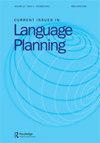表征语言政策和规划在国际组织:东盟的见解
IF 1.8
1区 文学
Q2 EDUCATION & EDUCATIONAL RESEARCH
引用次数: 4
摘要
虽然大多数国际组织原则上都使用多种语言,但由10个成员国组成的东南亚国家联盟(东盟)采取了一种激进的方式,即只使用一种语言,表面上是为了方便和实用主义。为了评估东盟的政策背景,本文将东盟与另外两个更熟悉的国际组织,即联合国(UN)和欧盟(EU)进行了比较和对比。本文试图使这些组织的语言政策和规划(LPP)合理化,以平等、包容性、实用性、工具性、经济可行性等原则为基础,甚至可以说是东盟背景下的“中立”。这些原则与语言意识形态的两种基本模式有关,即语言多元化和国际化,这是东盟、欧盟和联合国LPP的特点。文章提出的论点是,东盟已经接受了植根于国际化的英语单语制,而联合国和欧盟都在努力实现多语制,尽管是通过不同的多语言运作模式。然而,分析表明,以联合国和欧盟为特征的语言多元主义意识形态充其量是象征性的,因为这种意识形态实际上维持了英语的霸权,并在某种程度上维持了其他权力语言的霸权。这表明,东盟可能没有太多东西可以向欧盟或联合国学习,以替代其只讲英语的政策。本文章由计算机程序翻译,如有差异,请以英文原文为准。
Characterising language policy and planning in international organisations: ASEAN insights
ABSTRACT Although most international organisations are, in principle, multilingual, the ten-member Association of South East Asian Nations (ASEAN) has adopted a radical approach by operating monolingually, ostensibly for convenience and pragmatism. In order to provide an evaluation of the ASEAN policy context, this paper compares and contrasts ASEAN to two other more familiar international organisations, namely the United Nations (UN) and European Union (EU). The paper attempts to rationalise language policy and planning (LPP) in these organisations, grounded in principles such as equality, inclusivity, practicality, instrumentality, economic viability and even arguably, ‘neutrality’ in the context of ASEAN. These principles are discussed in relation to two underlying models of language ideology, i.e. linguistic pluralism and internationalisation, which characterise ASEAN, EU and UN LPP. The article presents the argument that ASEAN has embraced English-only monolingualism, rooted in internationalisation, while both UN and EU strive to achieve plurilingualism, albeit through divergent multilingual operational models. The analysis, however, shows that the ideology of linguistic pluralism characterising UN and EU is at best symbolic, as this ideology has practically maintained the hegemony of English and, to some extent, the other languages of power. This suggests that ASEAN may not have much to learn from EU or UN for an alternative to its English-only policy.
求助全文
通过发布文献求助,成功后即可免费获取论文全文。
去求助
来源期刊

Current Issues in Language Planning
Multiple-
CiteScore
4.80
自引率
16.70%
发文量
26
期刊介绍:
The journal Current Issues in Language Planning provides major summative and thematic review studies spanning and focusing the disparate language policy and language planning literature related to: 1) polities and language planning and 2) issues in language planning. The journal publishes four issues per year, two on each subject area. The polity issues describe language policy and planning in various countries/regions/areas around the world, while the issues numbers are thematically based. The Current Issues in Language Planning does not normally accept individual studies falling outside this polity and thematic approach. Polity studies and thematic issues" papers in this journal may be self-nominated or invited contributions from acknowledged experts in the field.
 求助内容:
求助内容: 应助结果提醒方式:
应助结果提醒方式:


